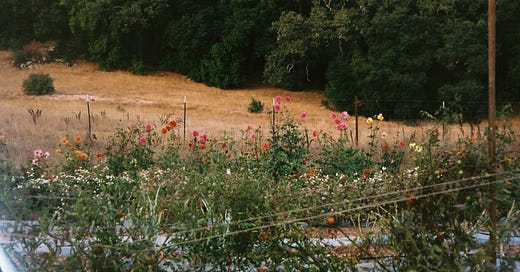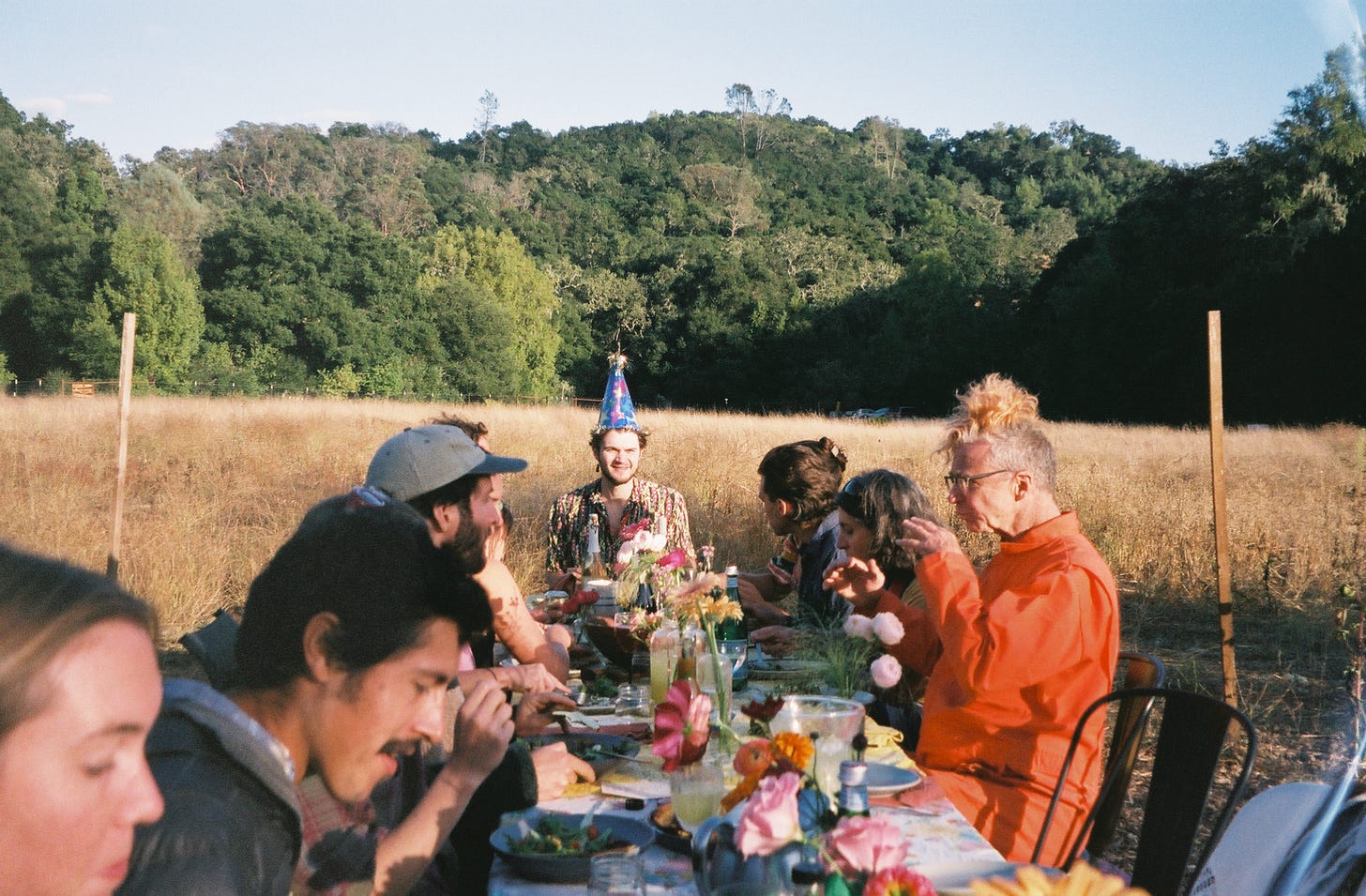Dear reader,
Every Tuesday at roughly seven o’clock, we come together at the ranch for our weekly house or “family” meeting. This meeting is likely the most important aspect of living on the ranch together; it’s how we stay abreast of the many happenings in our distinct lives, share our feelings, and coordinate ourselves to communally tackle the tasks required to keep our home happy and healthy. One of us spearheads cooking enough of something warm to feed everyone present at the table that night, based on our rotational weekly chores. Some of us volunteer to chop greens and mix dressings, while the rest of us trickle in from work, or surfing, or gleaning the field for Dahlias and the last tomatoes.
During my childhood and adolescence, being at home meant that I was mostly alone, sometimes for weeks at a time. My mother worked strange hours as a prep-chef and a personal trainer; in her time off, she flew to Italy to see her boyfriend. With his money, she hired an assortment of nannies through an agency to watch me in her absence, but when I turned thirteen I was deemed fit to take care of myself. Our apartment became very quiet without my mother, so I kept the television on to keep me company. I ate cans of Campbell’s soup and baked frozen chicken fingers and tater tots for dinner. When invited to sleep over at my best friend Rebecca’s house or eat dinner at Candi and Megan’s, I was elated.
Whether I have the capacity to sit through a two-hour meeting every week or not — and sometimes I don’t — the brief window when everybody arrives at the main house, but before we sit down at the table together, is one of my favorite times to be alive. It is hard to coordinate ten people, and it is rare that we are all on the ranch at the same time. But on Tuesday evenings, I sense everybody coming home, and can tell which of them are winding down the road by the sounds of their cars, save for Marysia — she drives a hybrid.
As we make our way into the kitchen, music plays while dogs chew on each other and cats wiggle and climb, vying for attention and food. The smell of bursting sweet potato rises from the oven — half forgotten; completely caramelized. Sticky water bubbles down the edges of the rice cooker. Personal belongings, like bags and oversized woven baskets, appear on every available surface, packed with old lunches, surf stuff, bushels of elderberry, sacks of acorns, roadkill venison, and books. We say hello with hugs and rotate around each other like whisks on a hand-mixer, completing our own individual tasks before collective needs take priority. Molecules of energy fill the rooms completely, and even when it’s overwhelming, I feel safer than I ever have.
Finally, the dinner bell rings (yes, the ringing of an antiquated iron bell that’s set upon a rotting fence post just outside the kitchen door signifies mealtime) and chairs from the library are dragged into the kitchen. We finish loading our plates with Ryan’s pickled onions, Lucia’s greens, and Swampy’s sprouts, assign a scribe to take notes for the meeting, and one by one we check in.
The first hour is dedicated to each other. We take anywhere from ten seconds to ten minutes to fill in the rest of the ranch on our personal lives. Sometimes an ice-breaker starts us off: What’s the worst lie you’ve ever told? What did you observe in nature today? But most of the time we just dive right in. I listen attentively and hear of job offers and rejection letters, of break-ups and sick parents, of travel plans and terminal diagnoses. I find out where the wildflowers are blooming and which campgrounds are still closed by way of somebody’s recent escapade up the coast. We remember who we are to one another; the bridge to compassion is maintained with each anecdote. I’m less likely to get pissed about a dirty sink if I know somebody’s heart is broken, or if the deal at work didn’t go through.
When I tell people that my landmates and I meet on a weekly basis, they are usually gobsmacked, or wary, or some combination of both. Many of the folks in my wider community have myriad obligations and commitments so excessively cumbersome that I understand their vexation. As is true most everywhere, everyone feels they’re already operating at the extent of their capacity. They’re busy enough; imagining an additional standing two-hour commitment every week sounds impossible. But it isn’t.
My landmates and I are no different than those skeptics in our community; we have just as much shit on our plates, both personally and professionally. I know I’m not the only one who occasionally feels the scarcity of time wrap its hands around my neck. And admittedly, we don’t always “accomplish” the goals of our meetings, despite the hours that go into them. By common estimates, roughly one in six house meetings devolves into resolving conflict or tension.
But it’s become increasingly clear to me that house meetings are the glue that binds. It is the space where we decide, together, what we want our home to be. It’s how we reach consensus on large topics, which we save until everyone finishes their check-in, like how we need to pack the rocks around the heating element in the barrel sauna so we don’t trip the breaker, or where the cattle exclusion fencing needs to go, or whose guests can stay in the loft which nights, or how we’ll manage the dogs when someone is out of town, or what our protocol is for saving bacon grease, or who’s going to rally the dump run for that given week, or who will be responsible for procuring chicken feed, or which of us are excited to harvest the neighbor’s olives for the community crush this Sunday.
House meeting is where we come to be heard, to be seen, to air our dirty laundry, to announce a clear “No.” or emphatically proclaim “Yes!”
If we can’t commit to listening to each other while we indulge in butter over bread with lentils, it is unlikely we ever will do much else with or in service to one another. Fortunately, we can commit. We have committed. Perhaps it sounds better to go home to a place without expectations at the end of a long day, but I assure you, that place does not exist — even if you live alone. As it so happens, I think accountability is better company than solitude.
Love,
Anna
This poem by Kathryn de Lancellotti. I have waved at Kathryn from afar over the last year. Even though she lives close by in the next canyon, we are mostly in each other’s orbits because our salty, sea-worn partners are friends. But on Sunday, I went to a poetry reading where Kathryn stood at the back of a small and crowded room and proceeded to gut me, and everyone I know, using words that came out of her. I will still wave to her, probably from afar, but now everything is different because, poetry. Listen to Kathryn read a different poem aloud here.
What God Is
I don’t want to hear what God is
from a book or a capitalist.
A bearded man on a spiritual quest
or from a pulpit.
I don’t want to hear about sin
or that desire leads to suffering.
I want a God who is Tantric,
moves slow from toe to crown.
One who appears in fire, in lotus
and between breath.
I want a God who watches
from as far as Sirius, close as skin—
bright star, obsidian.
I want a God who is an artist,
a woman, a man. One who labors
and bleeds, suckles on the afterbirth.
I want a God small enough
to watch the sun fall
into the Pacific.
To climb a eucalyptus,
to ravage a wild blackberry.
A God who takes pride in skinning
the mule deer, finds pleasure
in its helpless sway.
I want God to walk down
the golden staircase
for a taste
of this delicious hell.

Joined by the inimitable
, I am a guest teacher for the new class offering by called WRITING THE PERSONAL. The class takes place on three Sundays in December and brings together the poetic, personal, and political for essays of self discovery and service. I will be teaching on December 17th, looking at writing about our relationships with other people and ourselves. How do we decide what to do with writing that feels really personal? Read more and sign up here.This newsletter How to Keep Caring by
that outlines “the points where we tip from our highest and most treasured values to the other side, where we sometimes participate in the very behavior we profess to abhor, when we cause harm despite intending the opposite.”- On Sharpening Contradictions.
- on the perils of justification. “As long as we are in the business of justifying and condemning, we strengthen its corresponding field of consciousness and its basic axioms. We reinforce the impulse to commit violence so long as you think it is justified. Well guess what? In war, everyone always thinks the violence of their side is justified.”








I signed up for the class you’re doing and I’m so excited!
This was beautiful, Anna. Thank you for your words, as always.